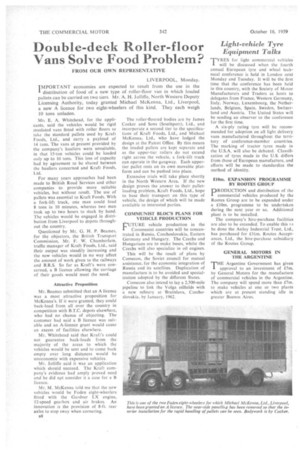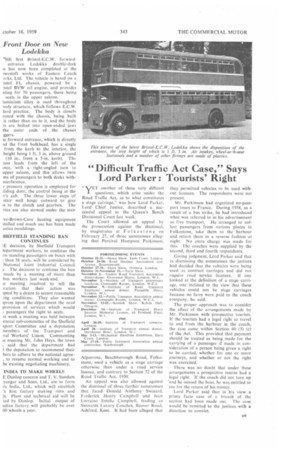Double-deck Roller-floor Vans Solve Food Problem?
Page 42

Page 43

If you've noticed an error in this article please click here to report it so we can fix it.
FROM OUR OWN REPRESENTATIVE LIVERPOOL, Monday.
IMPORTANT economies are expected to result from the use in the I distribution of food of a new type of roller-floor van in which loaded pallets can be carried on two tiers. Mr. A. H. Jolliffe, North Western Deputy Licensing Authority, today granted Michael McKenna, Ltd., Liverpool, a new A licence for two eight-wheelers of this kind. They each weigh 10 tons unladen.
Mn E. A. Whitehead, for the applicants, said the vehicles would be rigid insulated vans fitted with roller floors to take the standard pallets used by Kraft Foods, Ltd., and carry a payload of 14 tons. The vans at present provided by the company's hauliers were unsuitable, in that 15-ton vehicles could be loaded only up to I() tons. This loss of capacity had by agreement to be shared between the hauliers concerned and Kraft Foods, Ltd.
For many years approaches had been made to British Road Services and other companies to provide more suitable vehicles, but without result. The use of pallets was essential to Kraft Foods. With a fork-lift truck, one man could load 8 tons in 10 minutes, whereas two men took up to two hours to stack by hand. The vehicles would be engaged in distribution from Liverpool to depots throughout the country.
Questioned by Mr. G. H. P. Beames, for the objectors, the British Transport Commission, Mr. F. W. Chamberlain, traffic manager of Kraft Foods, Ltd., said their output was steadily increasing and the new vehicles would in no way affect the amount of work given to the railways and B.R.S. So far as Kraft's were concerned, a B licence allowing the carriage of their goods would meet the need.
Attractive Proposition Mr. Beames submitted that an A licence was a most attractive proposition for McKenna's. If it were granted, they could back-load from all over the country in competition with B.T.C. depots elsewhere, who had no chance of objecting. The customer had said a B licence was suitable and an A-licence grant would cause an excess of facilities elsewhere.
Mr. Whitehead said that Kraft's could not guarantee back-loads from the majority of the areas to which the vehicles would be sent and to come back empty over long distances would be uneconomic with expensive vehicles.
Mr. Jolliffe said it was an application which should succeed. The Kraft company's evidence had amply proved need and he did not consider it a case for a B licence.
Mr. M. McKenna told me that the new vehicles would be Foden eight-wheelers fitted with the Gardner LX engine. 12-speed gearbox and air brakes. An innovation is the provision of 8-ft. rear axles to stop sway when cornering.
B8 The roller-floored bodies are by James Cocker and Sons (Southport), Ltd., and incorporate a second tier to the specifications of Kraft Foods, Ltd., and Michael McKenna, Ltd., who have lodged the design at the Patent Office. By this means the loaded pallets are kept separate and as the upper-tier rollers do not extend right across the vehicle, a fork-lift truck can operate in the gangway. Each uppertier pallet rests on its own movable platform and can be pushed into place.
Extensive trials will take place shortly in the North Western Area. If the new design proves the answer to their palletloading problem, Kraft Foods, Ltd., hope to base their transport on this type of vehicle, the design of which will be made available to interested parties.
COMMUNIST BLOC'S PLANS FOR VEHICLE PRODUCTION
FU1Cmunist countries will be concentrated in Russia, Czechoslovakia, Eastern Germany and Hungary. The Czechs and Hungarians are to make buses, whilst the Czechs will also specialize in oil engines.
This will be the result of plans by Comecon, the Soviet council for mutual assistance, for the economic integration of Russia and its satellites. Duplication of manufacture is to be avoided and specialization adopted by the different States.
Comecon also intend to lay a 2.500-mile pipeline to link the Volga oilfields with a new refinery at Bratislava, Czechoslovakia, by January, 1962.
Light-vehicle Tyre Equipment Talks 'TYRES for light commercial vehicles I will be discussed when the fourth annual European tyre and wheel technical conference is held in London next Monday and Tuesday. It will be the first time that the conference has been held in this country, with the Society of Motor Manufacturers and Traders as hosts to delegates from France, Western Germany, Italy, Norway, Luxembourg, the Netherlands, Belgium, Spain, Sweden, Switzerland and Austria. The United States will be sending an observer to the conference for the first time.
A six-ply rating tyre will be recommended for adoption on all light delivery vans manufactured throughout the territory of conference-member countries. The marking of tractor tyres made in the U.S.A. will also be debated. Classification of tyres made in the U.S. differs from those of European manufacture, and efforts will be made to standardize the method of identity.
£10m. EXPANSION PROGRAMME BY ROOTES GROUP
PRODUCTION and distribution of the commercial vehicles produced by the Rootes Group are to be expanded under a £10m. programme to be undertaken during the next year or so. Additional plant is to be installed.
The company's hire-purchase facilities are also to be extended. To enable this t,*: be done the Astley Industrial Trust, Ltd., has purchased for E3+m. Rootes Acceptances, Ltd., the hire-purchase subsidiary of the Rootes Group.
GENERAL MOTORS IN THE ARGENTINE
THE Argentine Government has given
approval to an investment of Om. by General Motors for the manufacture of commercial vehicles in the Argentine. The company will spend more than £7m. to make vehicles at one or two plants which are at present standing idle in greater Buenos Aires.
Front Door on New Lodekka
HE first Bristol-E.C.W. forwardentrance Lodekka double-deck is has now been completed at the mestoft works of Eastern Coach orks, Ltd. The vehicle is based on a istol FL chassis, powered by -a istol BVW oil engine, and provides ating for 70 passengers, there being seats in the upper saloon.
luminium alloy is used throughout nody structure, which follows E.C.W. lard practice. The body is closely ;rated with the chassis, being built it rather than on to it, and the body rs are bolted into open-ended jaws the outer ends of the chassis ,ggers.
le forward entrance, which is directly nd the front bulkhead, has a single from the kerb to the interior, the height being 1 ft. 3 in. above ground (10 in., from a 5-in. kerb). Thit case leads from the left of the nee, with a right-angled turn to upper saloon, and this allows twin Ms of passengers to both decks withnterference, r pressure operation is employed for liding door, -the control being in the T's cab. The three lower steps of stair well binge outward to give is to the clutch and gearbox. The ries are also stowed under the stair ,ve-Brown-Cave heating equipment ;tailed and much use has been made asties mouldings.
1-1EFFIEL1) STANDING BAN CONTINUES CE decision, by Sheffield Transport lepartment workers, to continue the on standing passengers on buses with than 56 seats, will be considered by National Joint Industrial Council v. The decision to continue the ban made by a meeting of more than bus workers last week-end.
Le meeting resolved to tell the )ration that their action was tpted by a desire to secure reasonable ing conditions. They also wanted ipress upon the department the need provision of services which would passengers the right to seats, St week a meeting was held between eneral sub-committee of the Sheffield sport Committee and a deputation members of the Transport and :ral Workers' Union, Commenting le meeting Mr. John Heys, the town , said that the department had I the deputation to recommend their bers to adhere to the national agree, to resume normal working and to he existing negotiating machinery.
INDIA TO MAKE WHEELS E Dunlop concern and T. V. Sundam .yengar and Sons, Ltd., are to form is India, Ltd., which will establish 's first factory making rims and Is. Plant and technical aid will be ied by Dunlop. Initial output of ndian factory will probably be over 00 wheels a year.




















































































































